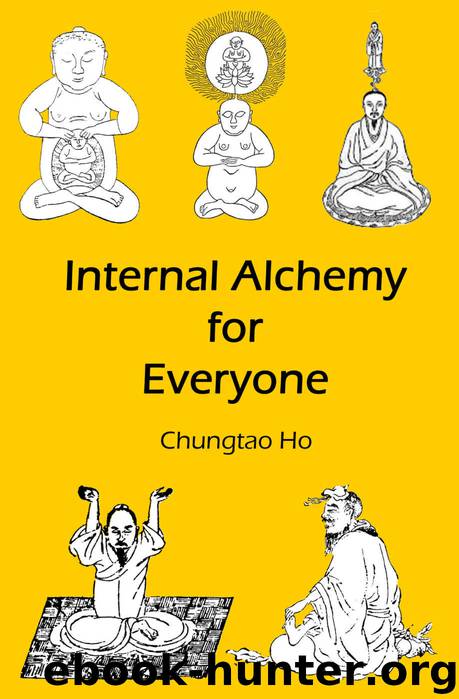Internal Alchemy for Everyone by Chungtao Ho

Author:Chungtao Ho [Ho, Chungtao]
Language: eng
Format: azw
Publisher: Three Pines Press
Published: 2018-10-11T16:00:00+00:00
Traditionally, Chinese men were the pillars their families, guaranteeing social status, financial support, and official relations for everyone: parents, wives, children, plus servants, often even including also aunts, uncles, and cousins. As a result, historical sources of internal alchemy suggest that adepts should engage in the practice only after they have fulfilled their household responsibilities, that is, after their parents have passed on and their children have reached maturity. This would make the average adept somewhere between forty-five and sixty-five years old, an age that I think is very appropriate. Once making the decision to move out to practice full-time, then, one should set up proper arrangements for all family affairs.
Both Daoism, especially Complete Perfection, and Buddhism offer monastic institutions, where recluses live the simplest of life with just the bare necessities and no wealth or obligations. They even beg for their daily food, thus realizing the ideal of emptiness on both the mental and material planes. This is extremely helpful, since the mind cannot concentrate on spiritual practice as long as it needs to deal with material goods, even more so if the latter are rich and varied, engaging the five senses.
In internal alchemy, unless they join a monastery, adepts have to rely on their own wealth to support their practice while completing the process, however, this wealth must not become a preoccupation or central concern. One must have enough, invested well enough, to provide for one’s needs during and also after completing the practice, without letting it interfere with the process. Thus Chen Zhixu states in his Jindan dayao,
Having wealth is a great help in setting up the cauldron and attaining Dao. Someone undertaking the great quest of cultivation must obtain enough wealth so he can purchase the ingredients. Once he has the necessary ingredients, he can concoct the elixir. After completing the elixir, he should take his remaining wealth and give it all away: in this way, he is different from ordinary people.[79]
Download
This site does not store any files on its server. We only index and link to content provided by other sites. Please contact the content providers to delete copyright contents if any and email us, we'll remove relevant links or contents immediately.
| Confucianism | Feng Shui |
| I Ching | Jainism |
| Karma | Shintoism |
| Sikhism | Tao Te Ching |
| Taoism | Tibetan Book of the Dead |
| Zoroastrianism |
The Tao of Physics by Fritjof Capra(2276)
Human Design by Chetan Parkyn(2075)
The Diamond Cutter by Geshe Michael Roach(2062)
Feng Shui by Stephen Skinner(1941)
The Alchemy of Sexual Energy by Mantak Chia(1860)
Tao Te Ching by Lao Tzu(1843)
365 Tao: Daily Meditations by Ming-Dao Deng(1625)
Tao Tantric Arts for Women by Minke de Vos(1600)
Sun Tzu's The Art of War by Giles Lionel Minford John Tzu Sun(1542)
Sidney Sheldon (1982) Master Of The Game by Sidney Sheldon(1520)
Buddhism 101 by Arnie Kozak(1514)
Karma-Yoga and Bhakti-Yoga by Swami Vivekananda(1496)
The Analects of Confucius by Burton Watson(1436)
The Art of War Other Classics of Eastern Philosophy by Sun Tzu Lao-Tzu Confucius Mencius(1429)
Tao te ching by Lao Tzu(1367)
The Way of Chuang Tzu by Thomas Merton(1366)
The New Bohemians Handbook by Justina Blakeney(1356)
The Sayings Of by Confucius(1318)
Bless This House by Donna Henes(1272)
